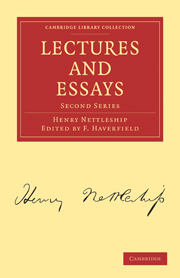Book contents
- Frontmatter
- PREFACE
- Contents
- Dedication
- MEMOIR BY MRS. NETTLESHIP
- I JOHAN NICOLAI MADVIG
- II THE ORIGINAL FORM OF THE ROMAN SATURA
- III LITERARY CRITICISM IN LATIN ANTIQUITY
- IV THE HISTORICAL DEVELOPMENT OF CLASSICAL LATIN PROSE
- V LIFE AND POEMS OF JUVENAL
- VI THE STUDY OF LATIN GRAMMAR AMONG THE ROMANS IN THE FIRST CENTURY A. D.
- VII ON THE PRESENT RELATIONS BETWEEN CLASSICAL RESEARCH AND CLASSICAL EDUCATION IN ENGLAND
- VIII THE MORAL INFLUENCE OF LITERATURE
- IX CLASSICAL EDUCATION IN THE PAST AND AT PRESENT
- X AUTHORITY IN THE SPHERE OF CONDUCT AND INTELLECT
- XI THE RELATIONS BETWEEN NATURAL SCIENCE AND LITERATURE
- BIBLIOGRAPHY
- INDEX
VIII - THE MORAL INFLUENCE OF LITERATURE
Published online by Cambridge University Press: 05 October 2010
- Frontmatter
- PREFACE
- Contents
- Dedication
- MEMOIR BY MRS. NETTLESHIP
- I JOHAN NICOLAI MADVIG
- II THE ORIGINAL FORM OF THE ROMAN SATURA
- III LITERARY CRITICISM IN LATIN ANTIQUITY
- IV THE HISTORICAL DEVELOPMENT OF CLASSICAL LATIN PROSE
- V LIFE AND POEMS OF JUVENAL
- VI THE STUDY OF LATIN GRAMMAR AMONG THE ROMANS IN THE FIRST CENTURY A. D.
- VII ON THE PRESENT RELATIONS BETWEEN CLASSICAL RESEARCH AND CLASSICAL EDUCATION IN ENGLAND
- VIII THE MORAL INFLUENCE OF LITERATURE
- IX CLASSICAL EDUCATION IN THE PAST AND AT PRESENT
- X AUTHORITY IN THE SPHERE OF CONDUCT AND INTELLECT
- XI THE RELATIONS BETWEEN NATURAL SCIENCE AND LITERATURE
- BIBLIOGRAPHY
- INDEX
Summary
In choosing this subject for an evening lecture, I need hardly say that I had no thought of attempting to exhaust it; still less did I suppose that I had anything new to say. An hour is a very short time to give to a great subject on which much has already been said and written. On the other hand, a great subject has this advantage over a small one, that it invites more attention and stimulates more interest, and thus the points to which one can attract notice in a short time are more likely to remain in the memory, and suggest reflection afterwards.
(I) It is hardly superfluous to ask—What is literature? We are apt to think of literature as the contents of books, and books as an affair of ink and paper, half, if not altogether, dead; something removed from the real life of the world. And no doubt it is true that a mere knowledge of books is not the same as a knowledge of life and of the world; it is not the same thing, and it is a very inadequate substitute for it. But look at the matter a little more closely, and one sees that the line is drawn too rigidly. For books are, after all, nothing more or less than voices speaking to us—not the voices merely of our own friends and contemporaries, but of a long line of past generations; human life that has escaped the grave, still appealing to us for our homage, our love, our sympathy, our condemnation, or our abhorrence.
- Type
- Chapter
- Information
- Lectures and EssaysSecond Series, pp. 191 - 207Publisher: Cambridge University PressPrint publication year: 2010First published in: 1895



